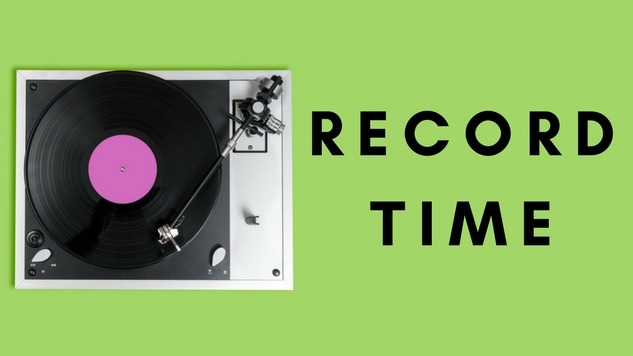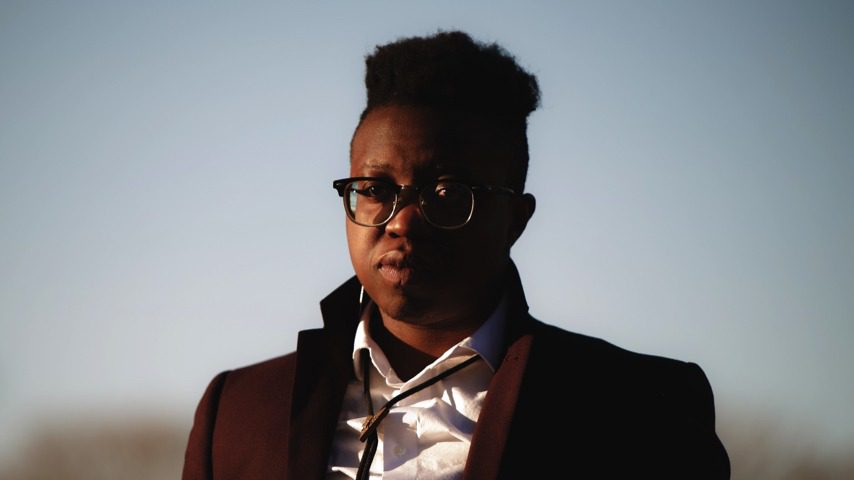Record Time is Paste’s monthly column that takes a glimpse into the wide array of new vinyl releases that are currently flooding record stores around the world. Rather than run down every fresh bit of wax in the marketplace, we’ll home in on special editions, reissues and unusual titles that come across our desk with an interest in discussing both the music and how it is pressed and presented. This month that includes a deluxe reissue of an R&B classic, modern sounds from the Chicago jazz scene, and a psychedelic cult classic.
Whitney Houston: Whitney Houston: 35th Anniversary Edition (Arista/Vinyl Me, Please)
You’re not really buying this deluxe reissue of Whitney Houston’s massively successful debut album for the colored vinyl repressing of the record itself. Original copies can be had for cheap (and likely sound as good or better than this version). Maybe you’re grabbing it for the first-ever U.S. vinyl release of Whitney Dancin’ Special, the collection of remixes—previously only available in Japan—that comes packaged with Houston’s self-titled LP. But really, the draw for this is the hardcover book that comes with each copy, which, alongside a wealth of photos and news clippings from the time of the album’s release, features testimonials from Clive Davis, the Arista Records founder who took a special interest in cultivating Houston’s career; the executor of her estate; and some of the musicians that took part in its recording. It adds up to a dynamic portrait of an artist on the rise and the village of associates and friends that helped lift her into the pantheon. Is that alone worth the $70 price tag for each copy? That’s for you to decide.
Kahil El’Zabar’s Spirit Groove: Kahil El’Zabar’s Spirit Groove ft. David Murray (Spiritmuse)
Spiritmuse Records may be based in the UK, but their heart seems fixed in Chicago’s vibrant jazz scene. The label’s first release was a reissue of a holy grail private press release from sax player Abdullah Sami and they followed it with some new recordings by percussionist Kahil El’Zabar, both men from the Windy City. The latest Spiritmuse release feels even more enmeshed in that town’s music community: a recording of El’Zabar and saxophonist David Murray, joined by two young locals (bassist Emma Dayhuff and keyboardist Justin Dillard) captured both live and in the studio. The group is aptly named as these musicians continue to lock into a steady rhythm, inducing a hypnotic state that’s only broken up by humble solos and Murray’s pleasant intrusions. Every song is a deeply felt without being overly considered—an expression of the true spiritual freedom that can often only be found in an enveloping, intoxicating piece of music.
Bill Kirchen: Waxworks: The Best of the Proper Years (Last Music)
Singer-songwriter and self-proclaimed Telecaster master Bill Kirchen was made his first splash as a member of the jam-adjacent outfit Commander Cody and his Lost Airmen and with plum gigs backing up Nick Lowe, Elvis Costello and Hoyt Axton. Since the ‘90s, Kirchen has been releasing solo material that pays tribute to his rockabilly influences and smacks of the wry humor that he’s carried with him from the start. This collection cherrypicks from three fairly recent albums released through Proper Records that provides a compact glimpse into both his prowess on the guitar and his limited range as a vocalist. Kirchen was smart enough, at least, to lean on some of his more talented friends to beef up his original tunes and tastefully handled covers. Lowe and Costello both make appearances as does fellow rock lifer Dan Hicks and folk-pop queen Maria Muldaur. But even with their support, each song feels like an exercise in patience, waiting until the vocals will clear out of the way and Kirchen’s masterful guitar work is given a chance to burst forth.
Tim Buckley: The Dream Belongs To Me (Rare and Unreleased Recordings – 1968/1973) (Real Gone Music)
Lest there be any confusion: much of the material compiled on this new Tim Buckley collection has been in circulation for at least 20 years. What Real Gone is doing is giving these demo versions of material that the revered singer-songwriter recorded over the course of a few sessions. The two LPs, and the incisive liner notes from journalist Randy Bookastra, reveals Buckley’s warring interests. The material from 1968—which would be fleshed out for his albums Happy Sad and Blue Afternoon—kept its striving, psychedelic whorls and revealed a growing influence of jazz. The later recordings were Buckley’s attempt to play the corporate game and write some material that might be appealing to the masses, and to that end, it’s almost painful to hear him bend so readily to the whims of his benefactors at Warner Brothers and Discreet. The earlier work, though, is alone worth the price of admission. Backed up by percussion, electric guitar, and vibraphone, “Happy Time” and “Ashbury Park” burn like sweet incense, and an early version of his classic “Song To The Siren” is, even in its nascent form, touched by magic.
Dr. John: Ske-Dat-De-Dat: The Spirit of Satch (Last Music)
Originally released in 2014, this tribute to the late Louis Armstrong wound up being the final recording by Dr. John, the New Orleans jazz/soul mystic who passed away last June. And, as you surely imagine, he and an impressive roster of guest stars tackle classics like “What A Wonderful World,” “Dippermouth Blues,” and “Wrap Your Troubles In Dreams” with fresh eyes and a thorough disinterest in simply repeating the sound of Satchmo’s original recordings. “Mack The Knife,” for example, is given a deep funk overhaul, complete with an unfortunate bit of rapping from Mike Ladd. “Gut Bucket Blues” stays true to its title with some welcome intrusions by trumpeter Nicholas Payton. And “Memories of You” becomes noir blues with a smoky vocal turn by the good Doctor and a lovingly punchy solo from Arturo Sandoval. Purists may scoff, but they should take this in the spirit in which it was intended. Armstrong or any of the folks who wrote these standards wanted them to be updated and adapted to meet the needs of our modern times.
The Electric Prunes: Release of an Oath: The Kol Nidre (Reprise/Real Gone Music)
By 1968, the Electric Prunes weren’t the band that scored a #11 hit with their psychedelic classic “I Had Too Much To Dream (Last Night).” In fact, almost none of the members of the band that recorded that single and two subsequent albums played any part of this cult classic—they lost the rights to the group’s name to their manager David Hassinger. So, while it’s an Electric Prunes record in name, every note is played by L.A. session musicians. The star of the show is, instead, the man who got a credit on the front cover: producer and arranger David Axelrod. It was his idea to turn religious prayers and liturgies into acid rock symphonies, complete with a groaning string section, marimbas and clavinets. Long adored by psych rock collectors, the album has fallen in and out of print since its initial release. Real Gone Music is finally getting a fresh edition of the album out now, mastered at 45 RPM for, as the hype sticker says, “maximum fidelity.” But that fidelity only gets reduced by pressing the music onto maroon and white vinyl. Directly out of the shrinkwrap, the record crackles and pops like a well-loved original pressing with the noise cutting right into the otherwise explosive guitar solos and proggy arrangements.
Nicole Mitchell & Lisa E. Harris: EarthSeed (FPE)
Recorded live at the Art Institute of Chicago, EarthSeed is the creation of Nicole Mitchell and Lisa E. Harris, two musicians and artists whose paths crossed at a residency in New Orleans and found in one another a mutual respect and mindset. They also found a mutual love of Octavia E. Butler, the Black author who used science fiction to call out the systemic racism that is deeply embedded into the roots of our society. EarthSeed uses Butler’s work to jump into their own allegorical tale of a preacher’s daughter looking to heal the community around her with a new spiritual practice. These heady themes are reflected in music that shimmers and groans like the birth of a new island or the emergence of a new creature pulling itself loudly out of the ground. It’s the kind of sonic journey that should be accompanied by an equally challenging psychedelic animated film a la Fantastic Planet. But on its own, especially when listened to through headphones, the visions you have while letting this challenging, and occasionally playful music dancing through your headspace should be more than enough.
Albert Ayler: New Grass (Impulse!/Third Man)
Originally released in 1969, the penultimate album of Albert Ayler’s sadly short life was considered the sound of this pioneering jazz artist selling out. Because instead of using his usual cohort of backing musicians, he grabbed folks like bassist Bill Follwell and drummer Bernard Purdie to lay a foundation of deep funk grooves for Ayler to squeal over. If you think that’s the sound of “selling out,” wait until you hear the rest of his discography. That strange consensus may be part of the reason that this album hasn’t received the reissue treatment that many other Impulse releases have gotten over the years. Leave it, then, to Jack White’s Third Man Records to swoop in and rescue New Grass from ignominy with a new vinyl pressing that sounds as startling and incredible as it ever has. The rhythm section especially sounds intensely present, as if Purdie and Follwell are sitting behind you and playing along as the record spins. This reissue also opens up another well of regret that Ayler wasn’t able to more fully explore these sounds and ideas before his untimely death in late 1970.
Iron City Houserockers: Have A Good Time But… Get Out Alive! (Cleveland International)
Quintessential Rust Belt pub band Iron City Houserockers had a brief existence—about eight years all told—and only released four records in their time together. But they left a large enough impression during their time that they were able to call on some impressive names to help arrange and produce their second album, including E Street Band member Steven Van Zandt, guitarist Mick Ronson and Mott The Hoople leader Ian Hunter. With their assistance, the Houserockers found a new gear that helped push their songs of romantic woes and hard drinking and self-reflection to greater peaks. Listening to it now, some 40 years after its original release, the future sound of other American outfits like The Hold Steady and Drive-By Truckers is evident, as is the sound of groups like Graham Parker and the Rumour, which was mining similar musical territory at the same time as the Houserockers. This 40th anniversary edition is a simple recreation of the original release, with much improved sound. Just make sure that your copy comes with a download card, as that includes a wealth of bonus material including demos and rare tracks from the era.




